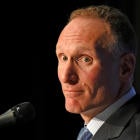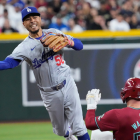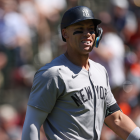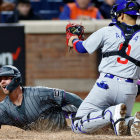When the Toronto Blue Jays play the New York Yankees on Friday, their lineup will include most (if not all) of Vladimir Guerrero Jr., Bo Bichette, Cavan Biggio, Lourdes Gurriel and Danny Jansen -- or, the young hitters supposed to lead the organization back to October's shores.
For the most part, those youngsters have performed. Guerrero has raised his OPS+ to 113; Bichette just made history; Biggo has been fine; Gurriel has been a pleasant surprise; and only Jansen has truly disappointed. Yet you can excuse any Blue Jays fan who isn't as psyched as they thought they would be back when they were devouring prospect lists and dreaming of this day. That's because "this day" followed an underwhelming trade deadline in which the Blue Jays received so-so returns in exchange for pitchers Marcus Stroman, Aaron Sanchez and Joe Biagini -- each under team control for at least a season longer.
"This day" also comes after Mark Shapiro, Toronto's club president and CEO, spoke about the team's offseason. Shapiro said the Blue Jays will be "opportunistic" this winter. He said it's "not a great offseason for free-agent talent." He also said this, about the value of marginal wins:
"I would say all wins aren't created equal," Shapiro said. "So, a player who's a three-win player who takes you from 82 to 85 wins probably doesn't move that needle. But if you're at 87 wins and it takes you from 87 to 90, does that make sense?
"So, it's more like when we're at that point, when we have and you can get the player who helps take you from a good team to a team that's a potential championship team, we need to go out and get that player, and that support will be there."
To recap: Shapiro, who unnecessarily weakened his pitching staff, is now warning about the upcoming free-agent class, and is talking about how marginal wins aren't worth adding until the team is within shouting distance of the postseason. That wouldn't seem to bode well for anyone hoping the Blue Jays made a charge this offseason to better position themselves for 2020.
Shapiro's comments are a reminder of how baseball works these days. Teams preach about building the "right way" (often the cheapest way) and maintaining financial flexibility until the prospects are ready. Then, after the prospects arrive, they move the goalposts. It's nearly impossible to build a playoff-caliber roster without going outside the organization, be it through trades or free agency. A team unwilling to add high-grade players until it's already near playoff contention will, in all likelihood, never deem itself good enough to make the necessary additions.
Shapiro knows that, in part because in late 2015 he inherited a Blue Jays team that reached consecutive AL Championship Series by being proactive in wheeling and dealing. Shapiro installed his own general manager after that first season, following Alex Anthopolous's departure due to philosophical differences. The rumor at the time was that Shapiro had berated Anthopoulos for trading prospects, presumably since doing so made winning unsustainable.
Shapiro's improved, sustainable version of the Blue Jays are on pace to win 64 games this season. That would push their three-year average to 71 wins a pop.
At the same time, Toronto's payroll has dipped after increasing entering the 2016 and 2017 seasons. From Opening Day 2018 to Opening Day 2019 the Blue Jays shed $48 million from the books, per Cot's Contracts. As it stands, Toronto has less than $40 million in commitments for next season, not counting arbitration raises and potential extensions. A reasonable analysis of the Blue Jays would conclude that they could cash in on some of their financial flexibility, upgrade their bottom-five rotation with a few reasonable veteran additions.
But Shapiro isn't talking like someone who will do more this winter than the bare minimum. And where will that leave Toronto? Outside of the AL playoff picture for a fourth consecutive fall, one year closer to hearing about how this young core has failed them by not overcoming steep odds, and one year closer to having to hear Shapiro talk about how all the coming arbitration raises to the young core means they can't possibly make big-time free-agent additions -- and how, instead, they'll soon be forced to make more difficult decisions, like trading so-and-so or such-and-such. It's a never-ending cycle, in part because the goal for an executive like Shapiro isn't to win games or field the best possible team. It's to satisfy ownership by turning a profit.
Need evidence? Here's another one of Shapiro's statements:
"The only directive from ownership is to run a business that doesn't lose money, which means obviously payroll's going to reflect revenue and revenues are down because attendance is down," Shapiro said. "Part of the plan from day one, and part of the understanding, has been that there will be a time that we need to outspend, outpace revenue with spending on players."
Ignoring the potential for accounting tricks, maybe there will be a time when the Shapiro-led Blue Jays spend more money than they recoup in revenue. You'd be right to be skeptical though -- and it has a lot to do with the person in charge and what he's already saying about a team that, frankly, should be on the ascent rather than in this self-imposed purgatory.






















